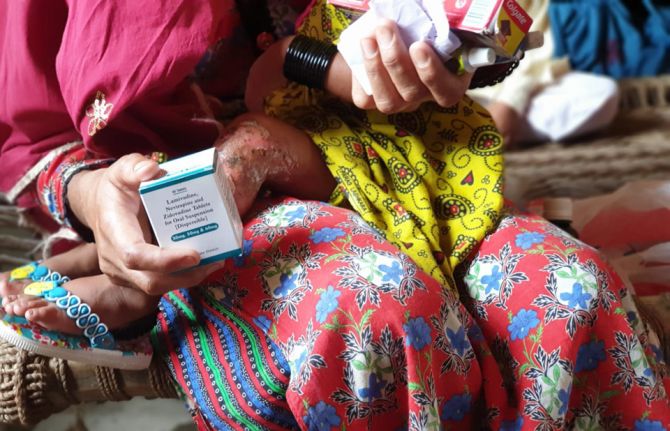

Feature Story
Pakistan: bringing services closer to communities affected by the HIV outbreak
03 July 2019
03 July 2019 03 July 2019A newly refurbished paediatric centre is to open in Ratodero, Pakistan, to serve families affected by the recent HIV outbreak in the district of Larkana. It is expected that the centre will be operational by mid-July.
Alia (not her real name), the mother of a two-year old girl, lives in the village of Mirpur Bhutto, in Ratodero Taluka in Larkana district. Alia’s world has been turned upside down since her family was caught up in the HIV outbreak in the area.
“My daughter was diagnosed with HIV just a few days ago, but she became so weak so quickly. She couldn’t eat anything we gave to her,” says Alia. After Sameera’s (not her real name) diagnosis, she was referred to Sheikh Zayed Children Hospital in Larkana to start antiretroviral therapy. The hospital is more than 50 kilometres away from the family home.
“I got these dispersible tablets for Sameera and some fever medicine, and since she started her treatment, I have seen some improvements in my daughter’s health. Her fever has gone and before there was diarrhoea from which she also recovered,” explains Sameera’s mother.
Alia’s husband is a farmer and earns less than two dollars a day. “We can hardly support our family of ten members,” she explains.
Poor road conditions and economic constraints make it difficult for Alia and her daughter to travel from their village to the district capital Larkana, currently the nearest health facility where her daughter can receive the treatment she needs.
Since the HIV outbreak was first reported in Larkana at the end of April, UNAIDS, UNICEF, the World Health Organization, the Sindh AIDS Control Programme and other partners have been calling for a new paediatric treatment centre in Ratodero to bring HIV services closer to the affected communities. As a result of these efforts and in the framework of the “Sindh HIV Outbreak Response Plan, May 2019-Apr 2020,” UNICEF is refurbishing the paediatric HIV treatment centre at Taluka Headquarters hospital in Rotadero, ensuring that treatment will be available in the area where Alia and her daughter live. When the new centre opens, HIV treatment services for Sameera will be less than 10 kilometres away.
“I know my Sameera will be fine and that she will get married and have children. This is what the doctor told me. For this to happen she must continue her treatment forever. I will follow the doctor’s instructions because this is what will save my daughter’s life,” says Alia.
By the end of June, 877 people had been newly diagnosed with HIV in the Larkana district. More than 80% of the new cases are among children aged under 15 years old. A total of 721 people had already been registered in care programmes and 482 people (365 of them children under the age of 15) were on treatment.
“UNAIDS is working closely with the government, civil society organizations, the association of people living with HIV, UN agencies and all other partners to ensure that both the immediate response to the HIV outbreak and longer-term programmatic measures will be implemented and sustained,” said Maria Elena Borromeo, UNAIDS Country Director for Pakistan and Afghanistan.
Region/country
Related
 Status of HIV Programmes in Indonesia
Status of HIV Programmes in Indonesia

24 February 2025


